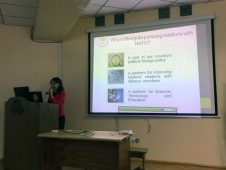On November 22, 2017 in Ms.Oyunsuren Damdinsuren’s International Conflict Resolution class, SIRPA alumna Ms. L. Byambakhand, who is currently working as a senior researcher at Institute for Strategic Studies of Mongolia (ISS), shared an interesting talk on NATO peacekeeping operations and Mongolia-NATO relations.

Ms. L. Byambakhand presented about NATO peacekeeping operations in Afghanistan, Kosovo and the Mediterranean while explaining the alliance’s policy shift from solely military and defense orientated activities to a more human approach engulfing conflict resolution, conflict prevention and reconstruction and development. This shift is clearly seen in NATO’s engagement in Mongolia. In Mongolia currently there are two projects being implemented within the framework of NATO’s SPS program: Geo-data base for the restoration of former military sites and Upgrade of the information infrastructure at the Mongolian Academy of sciences. Moreover, in cooperation with NATO, the Defense University of Mongolia is implementing the DEEP project which includes language, curriculum and faculty training.
Focusing on 5 countries in the Asia-Pacific region: Australia, Japan, Mongolia, New Zealand and South Korea, the ISS participated in “NATO Global Perceptions – Views from Asia-Pacific region” implemented under the framework of the NATO’s SPS. The project was aimed to systematically trace NATO’s external images and perceptions in Asia-Pacific by conducting media monitoring and elite interviews.
In her speech, Ms. Byambakhand stated the reasons of maintaining relations with NATO and its benefits for Mongolia enhancing relations with “third neighbor countries”. However she also emphasized that Mongolia’s position, unless in a time of war never to join any military alliance, to not permit foreign troops to use our land and air space against another state and to not allow a foreign military base or troops stationing on the Mongolian territory, will be upheld.

